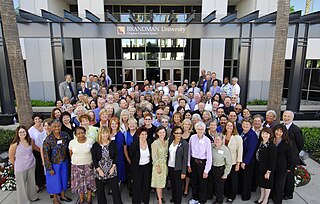Related Research Articles

The government of California is the governmental structure of the U.S. state of California as established by the California Constitution. California uses the separation of powers system to structure its government. It is composed of three branches: the executive, consisting of the Governor of California and the other constitutionally elected and appointed officers and offices; the legislative, consisting of the California State Legislature, which includes the Assembly and the Senate; and the judicial, consisting of the Supreme Court of California and lower courts. There is also local government, consisting of counties, cities, special districts, and school districts, as well as government entities and offices that operate independently on a constitutional, statutory, or common law basis. The state also allows direct participation of the electorate by initiative, referendum, recall and ratification.

The Ohio Department of Education (ODE) is the administrative department of the Ohio state government responsible for primary and secondary public education in the state. The Ohio State Board of Education is the governing body of the department and is responsible for overseeing the department. The board employs the Superintendent of Public Instruction, who runs the department. The department is headquartered in Columbus.

The state superintendent of public instruction (SPI) of California is the nonpartisan elected executive officer of the California Department of Education. The SPI directs all functions of the Department of Education, executes policies set by the California State Board of Education, and also heads and chairs the Board. The superintendent is elected to a four-year term, serves as the state’s chief spokesperson for public schools, provides education policy and direction to local school districts, and also serves as an ex officio member of governing boards of the state’s higher education system. The current superintendent of public instruction is Tony Thurmond.
Formal public school Education in West Virginia falls under the auspices of the West Virginia Department of Education. Each county in West Virginia constitutes a school district.
The Connecticut State Board of Education is the governing body of the Connecticut State Department of Education, which oversees the public education in the state, distribute funds to the state's 166 school districts, and operates the Connecticut Technical High School System.
The Tennessee Board of Regents is a system of public universities in the U.S. state of Tennessee. It is one of two public university systems, the other being the University of Tennessee system. It was authorized by an act of the Tennessee General Assembly passed in 1972. The TBR supervises all public community colleges and technical colleges in the state, dealing with over 140,000 students annually.

The California Department of Education is an agency within the Government of California that oversees public education.
The Oklahoma State Superintendent of Public Instruction, sometimes called the Oklahoma State School Superintendent, is the chief executive officer for the Oklahoma State Department of Education and the president of the Oklahoma State Board of Education. The State Superintendent of Public Instruction is responsible for overseeing, implementing and reviewing the policies of the Oklahoma's public school system.

The Institute of Education Sciences (IES) is the independent, non-partisan statistics, research, and evaluation arm of the U.S. Department of Education. IES' stated mission is to provide scientific evidence on which to ground education practice and policy and to share this information in formats that are useful and accessible to educators, parents, policymakers, researchers, and the public. It was created as part of the Education Sciences Reform Act of 2002.
The Massachusetts Board of Elementary and Secondary Education (BESE) is the state education agency responsible for interpreting and implementing laws relevant to public education in the Commonwealth of Massachusetts. Public education in the Commonwealth is organized according to the regulations adopted by the BESE, which are good faith interpretations of Massachusetts state and federal law. The BESE's responsibilities include granting and renewing charter school applications, developing and implementing the Massachusetts Comprehensive Assessment System (MCAS), submitting yearly budget proposals for public education to the Massachusetts General Court, setting the standards for and certifying teachers, principals, and superintendents, and monitoring—as well as intervening to ameliorate—the achievement of underperforming districts in the Commonwealth.
The Regents of the University of Michigan, sometimes referred to as the board of regents, are constitutional officers of the U.S. state of Michigan who collectively form the governing body of the University of Michigan, comprising the campuses at Ann Arbor, Flint, and Dearborn. The Board of Regents was first created by legislative act in 1837, and the regents as a body corporate have been defined in the Constitution of Michigan since 1850. There are eight regents, two of whom are elected to an eight-year term by statewide ballot every two years, plus the president of the University of Michigan, who serves ex officio but does not vote.
The California Basic Educational Skills Test (CBEST) is a standardized test administered in the state of California. It is available as an option in Oregon and Nevada. The test is intended to score basic proficiency in reading, mathematics, and writing. The test is divided into three sections: the reading and math sections each containing 50 multiple-choice questions; and the writing section, consisting of two essay questions. The entire test must be completed in four hours, and test-takers may allocate the time to each section at their discretion. There is no limit to the number of times the test may be taken. Test-takers do not have to pass all three sections in one sitting. A $41 registration fee for paper-based testing must be paid each time the test is taken.

The Michigan Department of Education (MDE) is a state agency of Michigan, in the United States. The MDE oversees public school districts in the state. The department is governed by the State Board of Education. The State Board of Education was first provided for in the Constitution of 1850 and currently exists through the provisions of Article VIII, Section 3, of the Constitution of 1963. The state board is composed of eight members nominated by party conventions and elected at-large for terms of eight years, with two members being elected at each biennial state general election. The governor is authorized to fill vacancies on the state board and also serves as an ex officio member of the state board, without the right to vote. The Superintendent of Public Instruction is appointed by the board for a term to be determined by the board, to serve as its chair, without the right to vote.
The New Hampshire Department of Education is the state education agency of the U.S. state of New Hampshire. It is headquartered in Concord. Frank Edelblut has led the department as commissioner since February 16, 2017.

University of Massachusetts Global, formerly known as Brandman University, is a private nonprofit university with 25 campuses throughout California and Washington and a virtual campus. The university offers more than 90 degree, certificate, credential and professional programs for working adults. Brandman was a separate, regionally-accredited university within the Chapman University system. In September 2021, Brandman separated from the Chapman University system, and formed a new affiliation with the University of Massachusetts, UMass Global. UMass Global retained its regional accreditation from the WASC Senior College and University Commission. Gary Brahm is the appointed chancellor of the university.

The California Transportation Commission (CTC) is an independent government transportation commission established in 1978. The CTC replaced and assumed the responsibilities of four prior independent agencies, the California Highway Commission, the State Transportation Board, the State Aeronautics Board, and the California Toll Bridge Authority. The CTC is headquartered in Sacramento.

National University (NU) is a private university with its headquarters in San Diego, California. Founded in 1971, National University offers academic degree programs at campuses throughout California, a satellite campus in Nevada, and various programs online. Programs at National University are designed for adult learners. On-campus classes are typically blended learning courses, concentrated to four weeks or on weeknights with occasional Saturday classes. The university uses asynchronous learning and real-time virtual classrooms for its online programs.
The Board of Regents for Higher Education (BOR) is a government body in the U.S. state of Connecticut that oversees the Connecticut State Colleges & Universities (CSCU). CSCU and the BOR were created on July 1, 2011, consolidating the governance of the state's twelve community colleges, four state universities, and Charter Oak State College. The BOR assumed the powers and responsibilities of the respective former Boards of Trustees and the Board for State Academic Awards; it also retains many responsibilities for setting statewide policy of the former Board of Governors for Higher Education.
The Kentucky Department of Education is an agency within the Government of Kentucky that is responsible for regulating education in the state.
References
- ↑ "CTC - We Have Moved!". Teachercred.ctc.ca.gov. Archived from the original on 2012-05-11. Retrieved 2012-06-22.
- ↑ "California Commission on Teacher Credentialing". Ctc.ca.gov. Retrieved 2012-06-22.